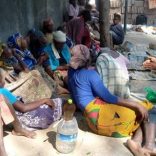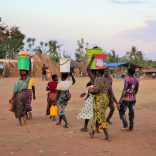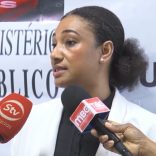Two million Mozambicans are facing food insecurity - government
Covid-19: Mozambique enters state of emergency

File photo: DW
The Mozambican parliament unanimously approved the increase in restrictions in the country to contain the spread of Covid-19. Public and private events are banned for 30 days. The opposition warns of risk of repression.
Mozambique today (Wednesday 01-04) enters a 30-day state of emergency, with a ban on all public and private events, including religious services, among the new measures taken to prevent the transmission of the new coronavirus.
The law declaring the state of emergency was approved on Tuesday night (March 31) by all 208 deputies present in the Assembly of the Republic just hours before it came into force.
In addition to the closing of schools, suspension of visas and advice against large gatherings, measures in place since March 23, entertainment establishments should now close, or reduce their activities.
The state of emergency allows for further limitations on circulation, but this will only be activated “if there is an exponential increase in cases of contamination”, as announced by the Mozambican President, Filipe Nyusi. The country has so far recorded eight cases of Covid-19, with no deaths.
The state of emergency will last throughout the month of April and allows defence and security forces to intervene if the measures are disregarded.
The criteria for mandatory quarantine have also been strengthened. All persons who have recently travelled outside the country or who have had contact with confirmed cases of infection must go into home confinement.
The new restrictions will make it possible to limit entry at the borders, which will continue however remain open for goods transportation and for matters of health or of the state .
Opposition fears repression
The ruling Mozambican Liberation Front (Frelimo) party welcomed the declaration of a state of emergency. “We fully and unconditionally support the declaration of a state of emergency, because it aims to protect a greater good, which is life, in the face of an imminent public calamity,” said Sérgio Pantie, Frelimo parliamentary whip. Frelimo has a majority of 184 deputies in the Assembly of the Republic.
For its part, the Mozambican National Resistance (Renamo), the country’s largest opposition party, with 60 seats in parliament, fears that the Frelimo government will use the restrictions provided for in the state of emergency to suppress people’s rights and freedoms.
“It is important to clarify the circumstances in which defence and security forces may be used, so that this resource is not used for the repression of political opponents,” Renamo deputy Venâncio Mondlane said, adding that the situation should not be harnessed to fuel authoritarian tendencies.
The Democratic Movement of Mozambique (MDM), the country’s third largest political party, with six deputies in the Assembly of the Republic, also issued a warning about restrictions. “The state of emergency should not be used to harass political opponents, journalists and civil society activists,” MDM deputy Fernando Bismarque said. “Defence and security forces must not use this state of emergency to abuse citizens’ fundamental freedoms and rights,” he added.
The MDM also called on the government to present a package of measures to protect employment and the private business sector, especially small and medium-sized companies, as well as other initiatives including food assistance to the elderly and disadvantaged.
Economy at risk
The consultancy Oxford Economics has written that the outlook for Mozambican economy has been significantly overshadowed by reduced exports of raw materials, armed attacks in the north and centre of the country and the Covid-19 pandemic.
Since the beginning of the year, the metical has depreciated by 6% due to the fall in the price of raw materials, which leads to higher prices for consumers and a shortage of products.
“The outlook for the evolution of the economy in the medium term has deteriorated rapidly over the last month, with the prices of its main exports, coal, aluminium and natural gas falling, due to the global panic induced by the new coronavirus,” the Oxford Economics analysts write in a note on Mozambique.
The consultant adds that “the sharp drop in natural gas prices, in particular, means that the development of the main liquefied natural gas projects is at risk”. In addition, armed attacks in Sofala and Cabo Delgado provinces threaten to “disrupt export logistics”.
Meanwhile, the Mozambican Banking Association (AMB) and the Mozambican central bank announced that Mozambique’s benchmark interest rate will rise from 18% to 18.4% in April.
The rise comes at a time when the Confederation of Economic Associations of Mozambique (CTA), the country’s main employers’ association, had asked for the prime rate, which defines the cost of money, to be cut in response to the pandemic.
It is the first time that the benchmark rate has risen since it was created in June 2017, with a value of 27.75%.












Leave a Reply
Be the First to Comment!
You must be logged in to post a comment.
You must be logged in to post a comment.